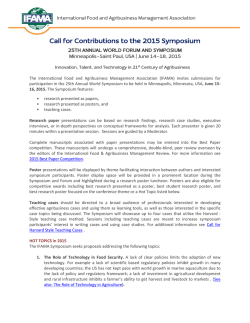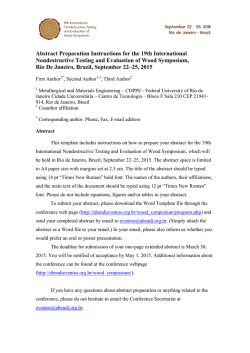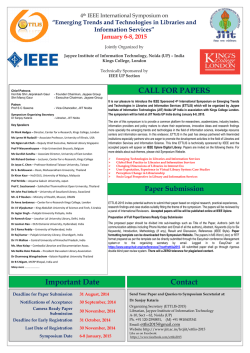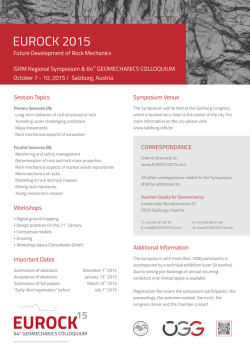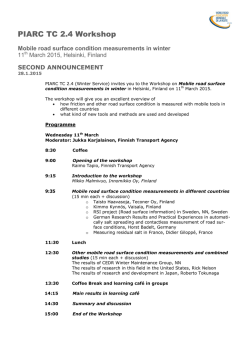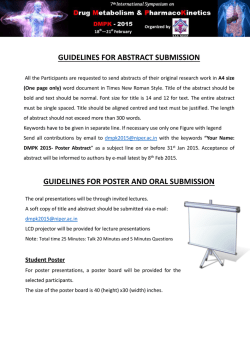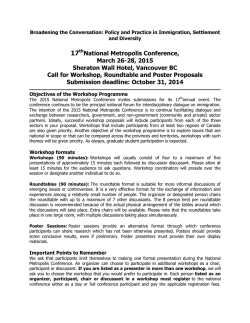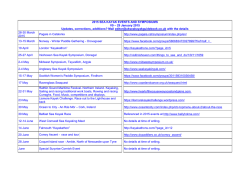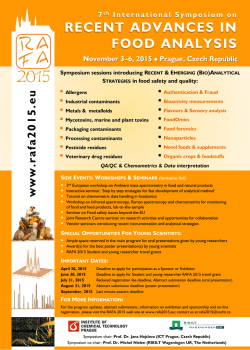
University of Cyprus logo
University of Helsinki 11th ESERA conference Science Education Research: engaging learners for a sustainable future -- ESERA 2015 -The biannual conference of the European Science Education Research Association University of Helsinki Helsinki, Finland 31.8.-4.9.2015 CALL FOR PAPERS Contents WELCOME MESSAGE .............................................................................................................. 3 ORGANIZATION OF THE ESERA 2015 CONFERENCE .......................................................... 4 CONFERENCE VENUE ............................................................................................................. 4 GENERAL REGULATIONS AND POLICIES .............................................................................. 4 CONFERENCE SESSION FORMATS ....................................................................................... 5 1. Single Oral Presentation ..................................................................................................... 5 2. Symposia ............................................................................................................................ 5 3. Interactive Poster Presentation ........................................................................................... 6 4. ICT Demonstrations and Workshops .................................................................................. 6 STRANDS.................................................................................................................................. 6 SUBMISSION OF PROPOSALS ................................................................................................ 8 SUBMISSION OF A SYMPOSIUM............................................................................................. 9 ESERA SPECIAL INTEREST GROUPS .................................................................................... 9 EDITING YOUR ESERA LOG-IN INFORMATION ..................................................................... 9 REVIEW PROCESS .................................................................................................................10 PUBLISHERS AND COMPANIES REPRESENTATIVES .........................................................11 IMPORTANT DATES ................................................................................................................11 WEBSITES ...............................................................................................................................11 CALL for ESERA PRE-CONFERENCE WORKSHOPS ............................................................12 Proposals...............................................................................................................................13 WELCOME MESSAGE Dear Colleagues, Welcome to the 11th Conference of the European Science Education Research Association (ESERA). The University of Helsinki is proud to host the ESERA Conference, and we are looking forward to welcoming you in Finland. We hope that the conference will enable you to share your research with an international research community and to engage in discussion about the pressing issues in science, technology and environmental education research. The theme of the conference is Science Education Research: Engaging learners for a sustainable future. The theme underlines the aspects that are of relevance in science education research and the human beings as responsible for a sustainable future: the need to reflect on different approaches to enhance our knowledge of learning processes, and the role of context, designed or circumstantial, formal or non-formal, in learning and instruction. Highlighting these themes does not mean underestimating or neglecting other important aspects of science education research and practice. We also hope the conference will be an enjoyable experience for all participants. Finland is a beautiful North European country. The University of Helsinki is an international academic community of 40,000 students and staff members. It operates on four campuses in Helsinki and at 17 other locations. Founded in 1640, the University of Helsinki wants to strengthen its position among the world's leading multidisciplinary research universities and to actively promote the well-being of humanity and a fair society. Helsinki is trendy and rich in culture, characterized by flavours of both East and West. The city has ample offerings for visitors who look for new experiences and lively cultural calendar all year round. Distinctive features of the city are large green areas and a strong presence of the sea. Helsinki is a welcoming city for the physically active. The close-by nature, parks, waterfronts and sea offer many opportunities. Wilderness is no more than half an hour from the city centre. We look forward to meeting all of you in Finland. Manuela Welzel-Breuer ESERA President Jarkko Lampiselkä ESERA 2015 Conference President 3 ORGANIZATION OF THE ESERA 2015 CONFERENCE The organization of the conference is undertaken by the University of Helsinki, Department of Teacher Education, directed by Dr. Jarkko Lampiselkä, in collaboration with the University of Eastern Finland, University of Jyväskylä, Åbo Akademi and the Luma Centre Finland. The Local Organization Committee (LOC) takes responsibility of the administrative management and coordination of the conference arrangements. It is comprised of a steering committee (Dr. Jarkko Lampiselkä), scientific committee (Professor Jari Lavonen) and a program committee (Dr. Anni Loukomies). The main responsibility for the review process and the scientific programme of the ESERA 2015 conference rests with an international committee of experienced science education researchers. This committee comprises of the members of the ESERA Executive Board and the Strand Chairpersons. If you have any questions or concerns about the ESERA 2015 conference, please contact the ESERA 2015 Secretariat at [email protected]. CONFERENCE VENUE All conference activities, including registration, will take place at the Messukeskus Helsinki, Expo and Convention Centre (Messuaukio 1, FI-00521 Helsinki, Finland; www.messukeskus.com). Lunch will be provided on site through a buffet arrangement, lunch is not included in the conference fee. Wi-Fi access will be available throughout the conference venue, free of charge. The conference venue is easily reached by a short bus, tram, or train ride from the Helsinki city centre. GENERAL REGULATIONS AND POLICIES The International Scientific Committee invites both empirical and theoretical proposals for symposia, paper presentations, interactive posters, and ICT workshops. The official language of the conference is English. Each registered individual can be an active participant in the conference at most 4 times. Each participant can be co-author as many times as they like. However, the following constraints must be kept: • Each participant can be the Presenting author of one oral paper and one symposium paper. • Each participant can be Coordinator of no more than one symposium and can be Discussant of one other symposium as a whole. • Each participant can be the presenting author of no more than one interactive poster presentation. • In total, the maximum number of roles cannot exceed 4. 4 Please note that the Coordinator of a symposium can also be the Presenting Author for one oral presentation in the same symposium. He or she cannot be Discussant of the same symposium. CONFERENCE SESSION FORMATS There are four types of submission: • Single Oral Presentation • Symposium Oral Presentation • Interactive Poster Presentation • ICT Demonstrations and Workshops Each presentation will be classified to one of the 19 strands mentioned later in this document. 1. Single Oral Presentation This presentation format allows for 15 minutes of individual presentation time followed by a 7minute discussion moderated by the session chairperson. Papers will be grouped by strand. Each accepted paper will be scheduled in a session of 90 minutes, normally with four presenters. 2. Symposia Each Symposium will be organized by a coordinator and will contain four (4) presentations concerning a common topic of interest and one discussant presentation at the end. The symposium participants must be from at least three (3) countries. There can only be one or two coordinators and only one or two chairpersons. These can be the same people or different. The organizer is in charge of submitting the symposium title, abstract and a synopsis for the whole symposium, as well as providing the name and contact details of a discussant. S/he will also submit the abstract and extended summaries of the individual presentations making up the symposium. Each symposium session will be given a 120-minute block of time in the programme: 20 minutes for each presentation, 10 minutes for the discussant, and a total of 20 minutes allocated for discussions. Symposia provide an opportunity to present research on one topic, often from multiple perspectives, providing a coherent set of papers for discussion. The coherence and quality of the symposium will be evaluated first as a whole. Each single presentation within a symposium will also be evaluated individually. If the coherence of the symposium is not evaluated positively, each accepted symposium oral presentation will be presented as a single oral presentation in different paper sessions. We recommend that symposia coordinators set an early deadline for possible contributors to submit to them and that each individual submission is checked for its own quality and its relevance and coherence to the topic of the symposium prior to formal submission to the ESERA conference. Please note that all participants in a symposium (authors, chairpersons, 5 discussant, coordinators) need to have a valid ESERA login/password before the symposium is submitted. 3. Interactive Poster Presentation Dedicated poster sessions will be scheduled in the conference programme. Each poster presentation will include a graphic presentation of a research study on visual display of size A0 (0,841m x 1,189m) in "portrait" format. A short oral presentation of 3 minutes for each poster is given to an audience gathered as a group. After the authors’ brief presentation, an in-depth discussion between them and the audience follows in the area of the poster displays. The poster sessions offer researchers the chance to present their work in a visual format and offer more opportunities for interaction and discussion. Poster sessions are scheduled for one and a half hours, during which the brief presentations and the poster-centred discussions take place. 4. ICT Demonstrations and Workshops ICT Demonstrations and Workshops enable presenters to display, explain and familiarize users with an innovative approach, a teaching or research tool, or some other aspect of research or teaching practice. The Workshop may include a brief presentation of completed research, especially case study or evaluation, but the emphasis is on demonstrating an innovation or a tool, not to present the research for criticism. Learning-by-doing occupies most of the session, and any presentations are brief. Adequate time for reflective discussion is important. The audience may offer their viewpoints and share their experiences with other tools or innovations intended for the same purpose. These sessions will be scheduled in computer labs where necessary. ICT demonstrations and Workshops are scheduled for 90 minutes. STRANDS 1. Learning science: conceptual understanding Theories, models, and empirical results on conceptual understanding, conceptual change and development of competences; methodology for investigating students’ processes of concept formation and concept use; strategies to promote conceptual development. 2. Learning science: cognitive, affective, and social aspects Cognitive, affective, and social dimensions in learning science. Design of in-school and extraschool learning environments and study of teaching/learning processes. Representational languages and knowledge organization. Collaborative construction of knowledge. 3. Science Teaching Processes Relations between teaching practices and students’ cognitive and affective development, design of teaching interventions. Research based intervention and its role for curriculum planning, instructional paths and learning outcomes. Laboratory-based practice. Video studies in science education. 4. Digital resources for science teaching and learning Design, evaluation and characterization of resources and environments for teaching/learning 6 science: ICT and TEL in science education. Online learning environments, simulation and modeling tools, virtual laboratories. Self-regulation, reflection and collaboration in digital learning environments. 5. Teaching-Learning Sequences as innovations for science teaching and learning Design of teaching and learning materials. Classroom implementation, refinement and evaluation of teaching sequences. Exchange and adaptation of teaching-learning sequences. Adoption and transformation of teaching materials. Factors that influence teacher ownership. 6. Nature of science: History, Philosophy and Sociology of Science The implications of nature of science, its history, philosophy, sociology and epistemology, for science education. The significance of models and modelling for science education as reflected in the particular importance attached to the use of metaphors, analogy, visualization, simulations and animations in science. 7. Discourse and argumentation in science education Understanding, supporting and promoting use of evidence and argumentation discourse in science education. Scientific practices related to knowledge evaluation and communication. Supporting the development of critical thinking. Discourse analysis. Talking and writing science in the classroom. Meaning making in science classrooms. 8. Scientific literacy and socioscientific issues Teaching about scientific literacy, science and citizenship education, science and media education, information literacy, informal reasoning and critical thinking, decision making, debates on socioscientific issues (SSI), discourse communities, social dimension of science and technoscientific practices, public engagement in science, schools', students' and teachers' engagement in socioscientific issues. 9. Environmental, health and outdoor science education Ecological and Environmental Education, Education for Sustainable Development, environmental health, health education and health promotion. Lifestyles and attitudes towards health and the environment. Developing and evaluating the impact of programmes and experiences outside classrooms, including those organized by institutions other than schools. 10. Science curriculum and educational policy Curriculum development. Reform implementation, dissemination and evaluation. International comparison studies such as TIMSS and PISA. Evaluation of schools and institutions. Policy and Practice issues: local, regional, national, or international issues of policy related to science education. 11. Evaluation and assessment of student learning and development Development, validation and use of standardized tests, achievement tests, high stakes tests, and instruments for measuring attitudes, interests, beliefs, self-efficacy, science process skills, conceptual understandings, etc; authentic assessment, formative assessment, summative 7 assessment; approaches to assessment. Monitoring student learning and implications for teaching. 12. Cultural, Social and Gender Issues in science and technology education Equity and diversity issues: Sociocultural, multicultural, bilingual, racial/ethnic, gender equity studies and science education for the special needs. 13. Pre-service science teacher education Professional knowledge of teachers, pre-service teacher preparation, instructional methods in pre-service teacher education, programs and policy, field experience, relation of theory with practice, and issues related to pre-service teacher education reform. 14. In-service science teacher education, continued professional development In-service science teacher education, teachers as lifelong learners; methods, innovation and reform in professional development; evaluation of professional development practices, reflective practice, teachers as researchers, and action research. 15. Early years science education Emergent science, science pedagogy and learning in the early years, cognitive resources for science learning, early years science and technology curriculum, innovative teaching practices in the early years, children’s learning, preschool science, early years teacher education in science. 16. Science in the primary school Procedural skills in science, science investigations, science teaching and learning sequences. 17. Science in the secondary school Procedural skills in science, science investigations, science teaching and learning sequences. 18. Science teaching at the university level University pedagogy. Teaching and learning at the university level. 19. Methodological Issues in Science Education Research SUBMISSION OF PROPOSALS Proposals should be submitted through the conference website. Before submitting your proposal, we recommend that you read carefully the guidance on the website about the content of proposals and the submission process. Submit your proposal through the web page: www.esera2015.org. The web page is open for submissions 15 Oct 2014 – 31 Jan 2015. A guide for writing a proposal is available on the web page: http://www.esera2015.org/proposal-submissions/. 8 Please note that before you can submit a proposal or register for the conference, you will need a valid ESERA username and password (http://www.esera.org/about-esera/membership/). When submitting a proposal you will also need to ensure that your email address is up-to-date in the ESERA members’ database and that you will not be using multiple email addresses when interacting with the on-line conference system. If you have any questions or concerns about proposal submission, please contact the ESERA 2015 Secretariat at [email protected]. SUBMISSION OF A SYMPOSIUM If you are submitting a symposium, you will need to ensure that the email address entered for each participant (i.e. authors, chairpersons, organizers, discussants) matches the email address they have entered in the ESERA database. Consequently, in order to submit a symposium, each one of the participants of the symposium should be an active conference participant with a registered ESERA login/password. In order to submit the symposium you will need the registered email for all the symposium participants. The email address will be used to retrieve the participants’ details from the ESERA database. If you have any questions or concerns about symposium submission, please contact the ESERA 2015 Secretariat at [email protected]. ESERA SPECIAL INTEREST GROUPS Special Interest Groups (SIGs) are intended to emerge as self-enabled organizing structures that will function as specialized, thematic groups within the ESERA community. SIGs will eventually be able to undertake an active role in the conference program organization and review process as well as have the opportunity to receive support from the Association in organizing parallel activities. • SIG 1: Early Years Science • SIG 2: Video based research of teaching and learning processes • SIG 3: Science education in out-of-school contexts • SIG 4: Science/Environment/Health (SHE) If you have any questions or concerns about the SIG groups, please see www.esera.org. EDITING YOUR ESERA LOG-IN INFORMATION You will be able to edit your details in the ESERA members’ database at any time. In order to retrieve your ESERA username / password, you will be able to use the password reminder functionality that will also be available on the site. If you have any questions or concerns about your ESERA login, please contact ESERA Secretariat [email protected]. 9 REVIEW PROCESS Depending on the format and type of research report, the proposals will be reviewed by at least two reviewers from countries that are different to those of the authors, according to the following criteria: EMPIRICAL PAPER • Relevance to science education research • Significance for theory, policy and practice • Theoretical framework, conceptual rationale or pragmatic grounding • Research method and design (research questions, context, participants, data sources, ethical issues) • Clarity of results, preliminary findings and conclusions • Overall quality and scientific originality • Language THEORETICAL PAPER • Relevance to science education research • Significance for theoretical debate • Theoretical framework, conceptual rationale or pragmatic grounding • Use of relevant research literature • Clarity and robustness of the theoretical argument • Overall quality and scientific originality • Language POSTER (EMPIRICAL) • Relevance to science education research • Significance for theory, policy and practice • Theoretical framework, conceptual rationale or pragmatic grounding • Research method and design (research questions, context, participants, data sources, ethical issues) • Preliminary data analysis or anticipated results • Overall quality and scientific originality • Language POSTER (THEORETICAL) • Relevance to science education research • Significance for theoretical discourse • Theoretical framework, conceptual rationale or pragmatic grounding • Use of relevant research literature • Clarity and robustness of theoretical argument • Overall quality and scientific originality • Language SYMPOSIUM AS A WHOLE • Relevance to science education research • Significance for theory, practice and policy • Theoretical perspective, conceptual rationale or pragmatic grounding • Organization, coherence and internal logic of the whole symposium 10 • Overall quality and scientific originality Each paper in a symposium will also be reviewed as an individual paper using the criteria for papers outlined above. ICT DEMONSTRATION or WORKSHOP • Relevance to science education research • Significance for theory, policy and practice • Theoretical framework, conceptual rationale or pragmatic grounding • Validation in domain of application (as teaching innovation, tool or research method) • Quality of workshop format (activity based) or demonstration activities • Overall quality and scientific originality • Language PUBLISHERS AND COMPANY REPRESENTATIVES Publishers and companies are welcome to have product exhibitions. Fee for organizing a product exhibition is 250 euros per day. The fee includes the table(s) for product exhibition, catering service for one day and wireless internet access. Additional days for product exhibition table and catering service are 200 euros/day. The all-inclusive fee for a five-day package is 950 euros. Contact [email protected] for detailed information concerning the size and location of the product exhibition table. IMPORTANT DATES • • Submission platform opens October 2014 Deadline for submission of proposals 31 January 2015 (24h00 Central European Time or GMT+1). Note that we are NOT able to extend the deadline. WEBSITES • • • • • ESERA and ESERA membership: http://www.esera.org; email: [email protected] ESERA2015 conference: http://www.esera2015.org; email: [email protected] ESERA and ESERA2015 announcements and news: http://www.facebook.com/ESERA.org, www.twitter.com/esera_org University of Helsinki: http://www.helsinki.fi/university/ Finland: http://www.visitfinland.com/ 11 CALL for ESERA PRE-CONFERENCE WORKSHOPS Aim The aim of the pre-conference workshops is to enable in-depth interaction for early career researchers, school teachers and other science educators through special sessions. Participants are able to interact with the facilitator and the other participants more deeply than is possible in the traditional ESERA poster, symposia and oral presentation sessions. Topic Workshops may focus on, for example, research methodologies, educational development projects, teacher training, and writing educational research papers. Workshops should reflect the ESERA conference theme Science Education Research: engaging learners for a sustainable future. Target groups We invite workshop organizers at the ESERA conference 2013 and the ESERA summer school 2014, the ESERA SIG coordinators, research methods experts, university teachers and researchers, EU project members, journal editors and companies that work in the field of technology and education to propose a workshop. Schedule Workshops are organized on the first day of the ESERA conference (August 31, 2015) from 9 am to 1:30 pm before the official opening. Workshops should have 20-40 participants each. Those with fewer than 20 participants may be cancelled and participants will receive a refund for any payments made. Workshops with more than 40 participants may be divided into two or more parallel workshops or the number of participants to the workshop may be limited to 40 persons. Registration Participants will register for workshops through the ESERA conference system. Also onsite registration to workshops will be offered. Fee Participant fee Participant fee for a workshop is 15 euros. The organizer of the workshop is regarded as a participant. Fee includes workshop room with wireless internet access, projector and lunch. Additional technology, like laptops or fixed network, is not included in the fee. Publisher/company fee The publisher/company fee for organizing a workshop is 350 euros. Fee includes workshop room reservation for Monday 31 August 2015 with wireless internet access, projector, a table for product exhibition if needed and catering service for one day. Additional days for product exhibition table and catering service are 200 euros/day. Allinclusive fee for five days package is 1000 euros. Contact [email protected] for detailed information concerning the size and location of the product exhibition table. 12 Proposals Deadline ESERA pre-conference proposals must be submitted to [email protected] 31 January 2015 (24h00 Central European Time) at the latest. Format Each proposal must contain the following information: 1. Title of the workshop 2. Contact information 3. Requested maximum number of participants (absolute maximum of 40 persons, if not also offered as a parallel session) 4. Short description of relevant areas of expertise for each workshop facilitator 5. Workshop abstract (for recruiting participants) 6. Workshop description (maximum 3 pages) • goal of the workshop • schedule • activities of all participants • expected roles of participants • list of literature relevant to the workshop topic and/or format. • materials or artefacts needed (note: local working group may redeem additional costs from the organizer for special equipment) Publisher/company proposals In addition to what has previously been mentioned, publisher/company organized workshops are organized in parallel with other workshops. A recognized member of the science education research community must co-host the workshop. The workshop must have a scientific orientation and a specialized emphasis related to research in science education that is particularly relevant to early career researchers, school teachers and other science educators. Review Process The ESERA conference scientific committee will carry out the review process. Proposals will be evaluated based on the following criteria • Focus: Degree to which the workshop focuses on issue(s) related to the advancement of science education knowledge and practice and/or methodology in conducting science education research targeted to early career researchers. • Relation to Conference Theme: Degree to which the workshop topic is related to the conference theme “Science Education Research: engaging learners for a sustainable future. • Outcomes: Degree to which the workshop design will lead to fruitful outcomes for workshop participants related to the advancement of science education 13 knowledge and practice or research methodology particularly for early career researchers, school teachers and other science educators. • Literature Base: Degree to which the workshop content is well grounded in one or more research literatures relevant to science education. • Systemic Importance: Degree to which the workshop content addresses an issue that is of systemic importance to the field of science education. • Interest: Degree to which the workshop topic is of interest to early career science education researchers. • Engagement: Degree to which the workshop delivery will enable all workshop participants to fully engage with the workshop foci. Decisions of the review process will be published in March 2015. Questions and inquiries: [email protected] 14
© Copyright 2026
